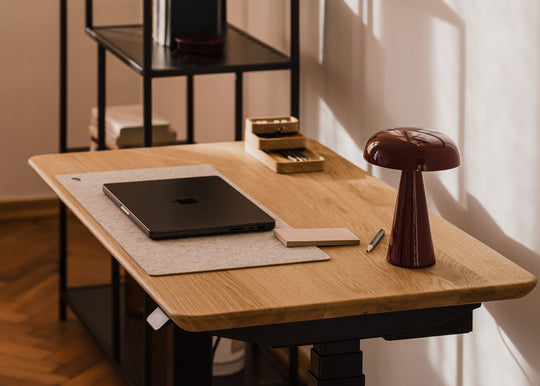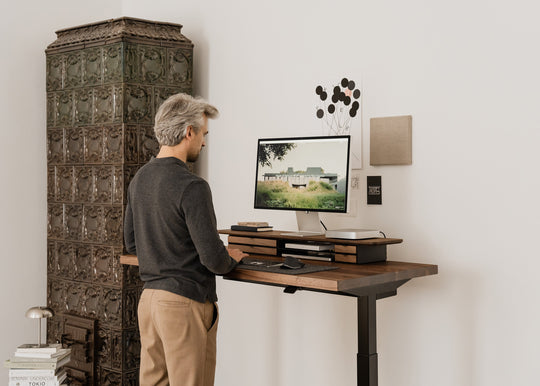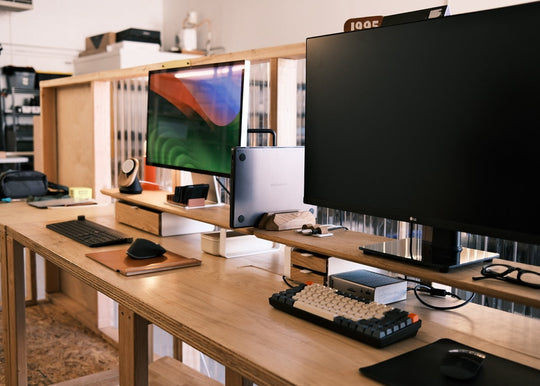Remote work is an ideal solution for introverts who find the abundance of outside stimuli detrimental to their work performance. It is also a great option for those who value flexibility and prefer to base their workplace relationships on responsibility and mutual trust and not constant control. There are, however, a few common pitfalls to look out for if you want to successfully combine productivity with a work-life balance.
1. Lack of designated workspace
A laptop and a stack of documents spread out on the kitchen table, responding to work emails in a horizontal position on the couch, constantly having to move your workstation to a new space that luckily happens to be unclaimed – not exactly how you’d imagine an ideal home office. If your goal is to successfully work from home, and such solution is not a temporary one, you need a permanent, well-organized space dedicated solely to your work.
If you don’t have a huge amount of space at your disposal, assigning even a small corner (ideally with access to natural light) that can hold a desk is a good first step. If possible, try to somehow separate your home office from the rest of the apartment. An ideal scenario would include a room designated for this very purpose but most of us can only dream about such luxury. An alternative to this could be setting up a desk in your living room or bedroom and using dividers such as a bookshelf, a folding screen, or even a free-standing planter to create a wall between your workspace and the leisure area.
Remember to only use your home office for work-related activities and not in your free time. When a given space is simultaneously home and a place of work, it becomes easy for the lines between your private and professional lives to blur and eventually lead to burnout. This is why it’s so important to form a habit of closing the office door (whether physical or metaphorical) after the workday ends, even if the said office is just a corner in your living room.
2. Disregard for office ergonomics
Neglecting the rules of ergonomics in your office setup is a serious mistake that could not only cost you your productivity but also be detrimental to your health. There are a few things worth researching when designing your home office, for example: how to best adjust your monitor, which office chair will keep you healthy and comfortable while sitting for an extended period of time, or which desk height is most appropriate for your stature.
Read about the golden rules of ergonomics in we drafted up together with a physiotherapist.
An ergonomically designed workspace must meet all your individual needs and a suitably fitted desk and chair will get you halfway there. Accessories are a great way of taking it even further. Investing in a laptop stand or a monitor shelf will put your screen at eye level and add an additional organizational surface to your desk. Losing time to look for an important note, a charging cable, or a single paperclip is the last thing you want when you’re on a roll. Functional organizers for small items can help you avoid those distractions and time wasters.
Tangled cords and cables beneath your desk are a trip hazard, an annoyance, and an eye sore. Luckily, you can neatly store them using an under-desk organizer to solve this problem.

Photo by Ella Jardim on Unsplash
3. Poor organization
Remote work allows for more flexibility and creative freedom when it comes to organizing your workdays. It can be an immeasurable convenience but also a hindrance, especially for newcomers who are not yet used to such big dose of independence. This can subsequently lead to chaos which increases the levels of stress, decreases productivity, makes it harder to meet deadlines, and negatively impacts your motivation and self-esteem.
As with office ergonomics, outstanding work organization can only be achieved when tailored to your specific needs. Here are some points worth following whilst curating your schedule:
- Make a ‘to do’ list and assign specific times to each task daily – you’ll plan your day much easier and won’t waste time trying to decide what to do;
- Create a priorities and goals list for the week and month – make some time to reflect on the past week/month and to plan the next;
- Don’t put tasks off waiting for inspiration to struck – take notice of when you’re most productive and plan your days accordingly;
- Factor in some time for breaks and meeting your work colleagues.
4. Excessive isolation
Lack of daily contact with your co-workers, absence of the dreaded break room small talk, and a chance to focus on work without the constant buzz of the open space offices sound like heaven for introverts, and remote work provides just that. Be careful, however, not to isolate yourself completely as this could have a negative effect on your job performance.
Keeping up with the members of your team consistently helps you to gain a new perspective and broaden your horizons which subsequently boosts creativity and improves problem-solving skills. Being able to ask your co-workers for feedback or help is what teamwork is all about.
Maintaining relationships with your colleagues doesn’t mean you can only talk about work – Platforms such as Teams, Zoom, or Google Meet are great in allowing you to socialize from time to time, share a ‘virtual coffee’, and get to know your co-workers on a human level. Such meetings are a chance for some quality team building, leading to improved communication within the group, and decreased chances of conflict.

Photo by Jarek Ceborski on Unsplash
5. Lack of regularly scheduled breaks
Being excessively available throughout the day is another mistake novice remote workers are especially prone to making (though even home office veterans aren’t entirely immune). The lack of near-constant scrutiny normally present in the physical office can, ironically, encourage an urge to always be able to respond to emails or answer calls – all to avoid even the faintest impression that you might be slacking off. The urgent need to prove that you’re ACTUALLY, REALLY, TRULY working might one day turn into professional burnout.
In order to keep your job performance high, you need to take regular breaks. Sitting at your desk and staring at the screen for 8 hours straight won’t make you efficient or employee of the month. It will, however, result in back problems, dry eyes, and chronic fatigue. Set aside some time for rest and let your colleagues know your schedule. Doing this will minimize stress, boost your energy, and do wonders for your productivity.











